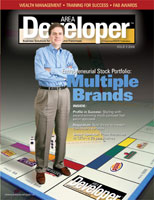What's Next?: How To Manage Your Hard-Earned Wealth
You have spent a lifetime setting and achieving goals, working plans, and building your business. You are well versed in the intricacies of managing scores of employees and multiple franchise units. You know real estate financing, cash flow statements, balance sheets, and the complexities of business accounting. You have dealt with personnel law, planning commissions, unemployment insurance filings, and periodic loan reviews. In short, you have been incredibly successful and you are fiscally astute.
Yet it surprises many hard-driving entrepreneurs to realize that building a business and wisely stewarding the profits from that business are two very different skills. The world of investing and financial management can present a new and complex frontier for the business owner challenged with navigating its rules, regulators, tax laws, and acronym-laden lexicon. Rather than simply putting you on Easy Street, your success has bred a new set of complex challenges.
What should you do with the cash flow your business is throwing off, or with the liquidity you would generate if you sold the business? How do you figure out where to invest this money to maximize after-tax return today and preserve maximum wealth for future generations? What are the primary attributes and drawbacks of investing in various investment asset classes?
Do you need a broker, a financial planner, a portfolio manager, a mutual fund, an annuity, or a coffee can? How can you best measure "risk" and balance the inevitable trade-off between risk and reward? What actions can you take in your estate and income tax planning to minimize estate, income, and gift taxes? How do you best develop a personal exit or transition strategy?
How can you best educate yourself--and your spouse and children--to be responsible, investment-savvy stewards of the wealth you have worked so hard to build? Is it possible to anticipate the emotional issues attendant to charting your family's personal money management course? And how do you measure the success of your investment program?
I hope to address many of these questions in this and future articles. This one discusses some of the broad goal-setting and psychological issues that must be identified before you can delve into the nitty-gritty of stocks, bonds, and portfolio management. My intent is to cut through the thicket to relate key investment and financial planning concepts--arming you with a core of knowledge that will help you be as successful in managing your liquid wealth as you were in creating it.
The life cycle of money
Most successful businesses go through a predictable life cycle of start-up, early growth, mature growth, and golden or "cash cow" years. Each phase has unique hallmarks related to expenses, funding, and cash generation. Individuals and families have similar money-life cycles. For most, the creation and possession of wealth progresses through four identifiable stages: creation, growth, consumption, and distribution/transfer. While we tend to think of our relationship with money as constant, each of these stages has unique attributes. For example, your willingness to put another mortgage on the house to fund the opening of another franchise location will likely depend upon the ages of your children, your own age and proximity to retirement, and/or your other outstanding obligations.
Identify your goals and objectives
Building your franchises did not just "happen." And it surely did not proceed without a plan that was methodically readdressed and tweaked as necessary. You must plan just as carefully as you begin to contemplate an eventual exit strategy (i.e., shifting from the growth phase to consumption). If your only "plan" consists of a calendar full of tee times, you have some work ahead of you.
The prospect of defining how to spend your newly liquid wealth may seem simple at first, but it can raise some complex issues. Those who have spent a lifetime scrimping and saving to build a business can experience a sort of shock after selling a business and moving relatively abruptly into "retirement." It also is common for sellers to go through a phase nearly like grieving once they are no longer intimately involved in the day-to-day details of the business.
Start by drawing a picture of what ultimate financial success looks like for you. Write down your "must haves" and "nice to haves" and attach dollar amounts to them (e.g, need $200,000 per year to support winter/summer homes + $50,000 for travel expenses). Be sure to include your significant other as you outline your plans for the post-sale phase of your lives. If you have not already shared your hopes and expectations, you may be surprised to learn that there are some differences of opinion! It is always wise to try to iron these out before you pull the plug.
Many newly retired business people are shocked at how difficult it can be to accurately assess their annual spending. It is often challenging to identify the expenses (travel, entertainment, cars, telephones, etc.) previously borne by the business that must now be supported by the individual. In addition, the recently unfettered commonly "experiment" with different or additional homes, exotic travel, sports cars, new country clubs, etc.
Be especially thoughtful about how you position your assets in the first several years after the sale while you are still "settling into" retirement. Do not put yourself into investments or other financial situations that would be difficult to unwind if you later change your mind and/or your lifestyle.
Take the time to outline and prioritize your most important spending goals. Though it may be difficult at first for you to get your arms entirely around how much you spend, it is vital to try. Aside from investment asset allocation (a topic I will address more completely next issue), the single biggest controllable factor impacting your ultimate net worth is how much money you withdraw each year from your investment portfolio. Spend too much too early, and you may be looking for a job when you are 70.
Risk: no "one-size-fits-all" rule
In addition to visualizing your dream retirement and/or "next phase," spend some time figuring out what you do not want to happen. This entails a thorough analysis of risk. Frame your analysis in terms of the "probabilities" that specific outcomes will occur. For example, if you want to put your money entirely in fixed-income investments, but plan to spend 5 percent of your assets each year, what is the likelihood that your portfolio can grow, given current interest rates?
If you are like most of the entrepreneurs and corporate executives I have met in my nearly 25 years in the money management business, you probably took a lot more risk getting to where you are today than you are willing to take with your assets moving forward. You may have easily accepted occasional difficulties while you were younger and building your fortune, but you probably do not wish to proceed as boldly, now that you are older and your net worth will be invested in markets you do not control. In much the same way that you can address expenses or head count at the business level, but not federal tax policy--you can choose a good manager or investment, but cannot control (or consistently predict) the markets, the economy, specific stock prices, or how investors in public securities react to corporate news.
Most people assume that investment "risk" refers only to day-to-day variations in market value or to absolute loss of capital. While these fluctuations are arguably the most noticeable, investment risk comes in other forms, too. Loss of purchasing power is a much greater long-term risk than day-to-day changes in market value. While stocks as an asset class may drop rather dramatically for a day, a month, or even several years, their long-term bias is still upward (unless you intend to write off the long-range growth potential of the entire nation). On the other hand, inflation eats away at the value of your dollar every minute of every day. At just 3 percent annual inflation (roughly the long-run average), $100,000 worth of 2005 income will buy less than $55,000 worth of goods in the year 2025. If your investments do not stay ahead of the insidious creep of inflation, you may not have enough money to maintain your standard of living over the long haul.
Some investors are affected by "prestige" risk if they cannot retain bragging rights to how much better their portfolio or individual investments are doing relative to those of their acquaintances. This is a dangerous game to play, since constantly seeking to outdistance friends can force you or your manager to take more aggressive actions with your portfolio than may be advisable.
How should you "measure" success?
Coverage of financial issues in the popular press has exploded over the past several decades as the number of individuals participating in the market has soared. Much of this media coverage focuses on slicing and dicing short-term performance records, which can create a vague sense of anxiety among investors if their own portfolios do not seem to measure up.
These tallies of "best and worst" are confusing at best--and often quite misleading. In many instances, the average investor has no way to calculate the risk profile or after-tax consequences in the investment strategy that generated the numbers in question. The investment at the top of the heap one year may well be at the bottom the next. Unfortunately, many individual investors--particularly those new to the process--chase these returns and hop from investment to investment with often disastrous investment results. In a July 2003 Wall Street Journal article, John Bogle, the outspoken founder of Vanguard Mutual Funds and a staunch industry critic, pointed out that between 1984 and 2002, the average stock mutual fund returned 9 percent per year--but the average stock mutual fund investor earned a mere 3 percent per year over the same time period because of the costs of hyperactive movement from one fund to another.
I have touched on a number of important concepts in this column, many of which I will have the opportunity to flesh out in more detail in coming articles. Next time, I will discuss specific investment asset class characteristics and how to think through choosing the type of financial advisory team that makes sense for you. In the meantime, please feel free to drop me a line regarding topics that you would like to see addressed in upcoming columns.
Carol M. Clark, CFA, is a partner and investment principal of Lowry Hill Private Wealth Management, a 20-year-old firm offering comprehensive investment and financial management services to more than 300 families from its offices in Minneapolis, Scottsdale, Ariz., and Naples, Fla. Prospective clients are willing to invest at least $10 million. She welcomes questions and comments at [email protected].
Share this Feature
Recommended Reading:
FRANCHISE TOPICS
- Multi-Unit Franchising
- Get Started in Franchising
- Franchise Growth
- Franchise Operations
- Open New Units
- Franchise Leadership
- Franchise Marketing
- Technology
- Franchise Law
- Franchise Awards
- Franchise Rankings
- Franchise Trends
- Franchise Development
- Featured Franchise Stories
FEATURED IN

Multi-Unit Franchisee Magazine: Issue 2, 2006

$500,000
$300,000





 The multi-unit franchise opportunities listed above are not related to or endorsed by Multi-Unit Franchisee or Franchise Update Media Group. We are not engaged in, supporting, or endorsing any specific franchise, business opportunity, company or individual. No statement in this site is to be construed as a recommendation. We encourage prospective franchise buyers to perform extensive due diligence when considering a franchise opportunity.
The multi-unit franchise opportunities listed above are not related to or endorsed by Multi-Unit Franchisee or Franchise Update Media Group. We are not engaged in, supporting, or endorsing any specific franchise, business opportunity, company or individual. No statement in this site is to be construed as a recommendation. We encourage prospective franchise buyers to perform extensive due diligence when considering a franchise opportunity.